Despite how much I like to think of myself as a liberal aware human being, in preparing for these articles, it came to my attention that I really can't think of many non-stereotypical Arab-American characters in American popular culture. I mean, I came up with a few, sure, and you'll certainly see my research showing in these next few weeks*, but in general, I was saddened to realize that there just plain isn't a lot of representation for Arab-American characters. Or even Arab/North African characters who appear in American media. Unfortunately, most of what we get is really really frustratingly stereotyped.
So, if I make any mistakes this month, mistakes that you recognize, please call me on them. I will freely admit that while I know what the hell I'm talking about in terms of media, I am far from the most-qualified to talk about issues surrounding the Arab-American community. So if you can tell I did something wrong, I'd really like to know.
With that disclaimer finally out of the way, then, today we're going to start off by talking about one of the more familiar characters on this list, a woman who you probably remember from a movie you've probably seen. We're talking about Tzipporah from Prince of Egypt, or as you might better remember her, the girl who drops Moses in the well.
By technical definitions, Tzipporah (voiced by Michelle Pfeiffer) is not Arab-American. She's a Midianite, part of a nomadic peoplegroup living in the region of the Sinai and Arab peninsulas. Definitely not an American. The reason I'm counting her for this series, however, is that she is appearing in a firmly American piece of media. She is a representation of Arab culture to us, Americans, and as such I totally say she counts. Besides, she's one of the more fascinating characters in the film.
We've covered Prince of Egypt before on here, but we didn't go into much detail on Tzipporah herself. Appearing near the beginning of the film, Tzipporah is the rare character who ties together Moses past in Egypt and his future as the prophet leading the Hebrew people. We first meet Tzipporah in the palace in Egypt, a captive who's been brought to the Pharaoh's sons for entertainment. She's basically a sex slave, tied up and being "displayed" for their amusement. She clearly doesn't appreciate this, fighting back, spitting, and generally trying to make herself undesirable. She's defiant, and as a viewer you like her immediately.
While Moses does help Tzipporah a little bit, calling away the guards before they spot her, really she is the one who saves herself, leaving Moses staring longingly at her shadow as she gets the hell out of dodge. That's the last we see of her for a while, but already we understand her as a really interesting character quite contrary from the usual portrayals of Arab women.
She next appears when, after Moses has left Egypt and travelled across the desert, he finds his way to her family's well and saves her sisters from brigands. Tzipporah is initially eager to help this man - who fell down the well immediately upon sending away the bad guys - but when she sees that it's the man who tormented her in Egypt, she literally dumps him back down while smirking. I'll be totally, honest, I liked her even more in that moment. Just a little.
Anyway, when Moses finally gets pulled out of the dang well, he finds himself a guest of Tzipporah's family and comes to learn their ways. Tzipporah's people are nomadic herders, primarily seeming to keep flocks of sheep. Tzipporah herself is established as a gifted shepherd and valuable member of her family. She's good at stuff, is what I'm saying. So as she and Moses slowly fall in love, it's clear that they do so from positions of equality. They're both shepherds, they're both adults, they're on an equal footing here. They are even, it should be noted, drawn as being just about the same height, which might not seem like a big deal, but means that Tzipporah reads as Moses' equal when they're face to face. Also it means she's really tall and a distinctive figure.
The rest of the film finds Tzipporah generally standing by Moses' side, though from a narrative perspective there really isn't much for her to do. Technically, this is Moses' show and Tzipporah is only along for the ride. But her inclusion in this part of the film is clearly intentional, and I'm actually very grateful for it. She has a few moments, standing up for Moses when the Hebrews turn on him and expressing her amazement that God came through in the end, but even her presence in this part of the movie goes contrary to the way we're used to seeing Arab women represented in media.
Tzipporah isn't meek, she isn't mild, and she's not going to stay at home because her husband doesn't explicitly need her at the moment. She's not the kind to keep the home fires burning, she's the type to go along on the adventure and kick some ass while she's there.
This probably doesn't sound particularly impressive or shocking to all of you reading, and to be fair, it kind of isn't. We should expect this sort of narrative treatment for women in film. Even if Tzipporah's role in the story is to be Moses' love interest, that's not reason for us to expect that she's a boring or whiny or damseled character. We ought to be able to assume that she's a super interesting person in her own right and expect that she will be shown as such throughout the movie. I mean, we can't expect that now, but we should.
The real impressive stuff, however, is all subtextual here. See, the movie never calls out and points at Tzipporah saying, "She and her family are a distinct ethnic/racial group from both the Hebrews and the Egyptians!" It kind of just lets the topic slide, because it doesn't matter. In so doing, however, we're treated to a low-key progressive vision of Middle Eastern culture, divorced from the usual stereotypes and tropes.
Yes, Tzipporah and her sisters still live at home with their father and presumably will or would until they're married. But after Tzipporah gets married, she and Moses are clearly still in the same tribal group, living in a different tent, maybe, but definitely connected to her father's family. And not because he's an overbearing patriarch either, just because it makes the most sense.
So it's not some "Sheikh" with all the power subjugating his daughters and selling them off to the highest bidder as we so frustratingly often see with depictions of nomadic Arab/Middle Eastern characters. Jethro (Danny Glover) is a great guy, and Moses and Tzipporah stick around because they like being around. Nothing more complex.
Nor is this a story where the codedly Western savior swoops in and saves a people from their backward ways. Moses might save Tzipporah sort of and definitely save her sisters later on, but they save him too. And at no point does he fall into the trope of being a white savior. The only people that Moses is called to save is his own people. Tzipporah and her family are doing fine. So fine, in fact, that when Moses wants to contextualize his vision of a freed Hebrew people, he points to Tzipporah's family and talks about how wonderful their lives are. These are not women who seem like they're being oppressed.
Speaking of oppression, in a lot of ways, Tzipporah's behavior and dress so completely contradict our cultural expectations for a Middle Eastern woman that it's easy to toss her out as being an anachronism. She's just inaccurate, you could say, the filmmakers put her in there so the feminists wouldn't get mad about how the women are really treated. You could say that, but you would be wrong.
While Tzipporah does experience a degree of freedom and confidence that women all of the world today can look at and envy, that doesn't mean she's not an accurate depiction of an ancient time Arab/Middle Eastern woman. If you actually take the time to read the Old Testament stories or check out the narratives surrounding the Qu'ran, you'll find this ridiculous wealth of information about how women in those times actually behaved, dressed, and were regarded by society. Some of it bad, some of it good, sort of like today.
As a character, Tzipporah comes off as just being a cool feminist addition to the Moses story, but when we view her in the context of being an Arab woman portrayed by American media, the overwhelmingly positive representation she and her family receive is actually really important. And while it's unfortunate and a little annoying that she was voiced by a white actress (as were almost all of the characters, save Jethro and Seti), Tzipporah still represents a really big shift in depictions of Arab women for an American audience.
She strikes against the idea that Arab culture is monolithic and singular, that all Middle Eastern women are oppressed, and that everyone from that part of the world looks exactly the same.
Perhaps the biggest testament to her revolutionary status as a character, however, is in considering her today. Would Prince of Egypt still get made these days with Moses marrying an Arab woman like this. I mean, you kind of can't get around it. Moses did marry into a Midianite family and that means that his wife was very definitely of Arab descent. As in, she and her family were from the Arabian peninsula. So, pretty literal here.
But a movie today would have to sidestep around all of this. Maybe in that version Tzipporah doesn't get to come with Moses. Maybe she needs to be rescued. Maybe her father is a jerk. Maybe she's drawn with lighter skin and white people hair. Maybe maybe maybe. I'm not magic, so I can't say for sure that any of these changes would be made, but I can say for sure that Tzipporah as she is would be considered inaccurate at best and dangerous at worst. And that alone is a reason to appreciate her.
So happy Strong Female Character Friday and happy start of Arab-American Heritage Month. We're going to be looking at a whole host of characters and stereotypes, hoping to examine how American pop culture typically depicts Arab-American characters and ways that this can improve in the future. Tzipporah is only the tip of the iceberg.
This probably doesn't sound particularly impressive or shocking to all of you reading, and to be fair, it kind of isn't. We should expect this sort of narrative treatment for women in film. Even if Tzipporah's role in the story is to be Moses' love interest, that's not reason for us to expect that she's a boring or whiny or damseled character. We ought to be able to assume that she's a super interesting person in her own right and expect that she will be shown as such throughout the movie. I mean, we can't expect that now, but we should.
The real impressive stuff, however, is all subtextual here. See, the movie never calls out and points at Tzipporah saying, "She and her family are a distinct ethnic/racial group from both the Hebrews and the Egyptians!" It kind of just lets the topic slide, because it doesn't matter. In so doing, however, we're treated to a low-key progressive vision of Middle Eastern culture, divorced from the usual stereotypes and tropes.
So it's not some "Sheikh" with all the power subjugating his daughters and selling them off to the highest bidder as we so frustratingly often see with depictions of nomadic Arab/Middle Eastern characters. Jethro (Danny Glover) is a great guy, and Moses and Tzipporah stick around because they like being around. Nothing more complex.
Nor is this a story where the codedly Western savior swoops in and saves a people from their backward ways. Moses might save Tzipporah sort of and definitely save her sisters later on, but they save him too. And at no point does he fall into the trope of being a white savior. The only people that Moses is called to save is his own people. Tzipporah and her family are doing fine. So fine, in fact, that when Moses wants to contextualize his vision of a freed Hebrew people, he points to Tzipporah's family and talks about how wonderful their lives are. These are not women who seem like they're being oppressed.
Speaking of oppression, in a lot of ways, Tzipporah's behavior and dress so completely contradict our cultural expectations for a Middle Eastern woman that it's easy to toss her out as being an anachronism. She's just inaccurate, you could say, the filmmakers put her in there so the feminists wouldn't get mad about how the women are really treated. You could say that, but you would be wrong.
While Tzipporah does experience a degree of freedom and confidence that women all of the world today can look at and envy, that doesn't mean she's not an accurate depiction of an ancient time Arab/Middle Eastern woman. If you actually take the time to read the Old Testament stories or check out the narratives surrounding the Qu'ran, you'll find this ridiculous wealth of information about how women in those times actually behaved, dressed, and were regarded by society. Some of it bad, some of it good, sort of like today.
She strikes against the idea that Arab culture is monolithic and singular, that all Middle Eastern women are oppressed, and that everyone from that part of the world looks exactly the same.
Perhaps the biggest testament to her revolutionary status as a character, however, is in considering her today. Would Prince of Egypt still get made these days with Moses marrying an Arab woman like this. I mean, you kind of can't get around it. Moses did marry into a Midianite family and that means that his wife was very definitely of Arab descent. As in, she and her family were from the Arabian peninsula. So, pretty literal here.
But a movie today would have to sidestep around all of this. Maybe in that version Tzipporah doesn't get to come with Moses. Maybe she needs to be rescued. Maybe her father is a jerk. Maybe she's drawn with lighter skin and white people hair. Maybe maybe maybe. I'm not magic, so I can't say for sure that any of these changes would be made, but I can say for sure that Tzipporah as she is would be considered inaccurate at best and dangerous at worst. And that alone is a reason to appreciate her.
So happy Strong Female Character Friday and happy start of Arab-American Heritage Month. We're going to be looking at a whole host of characters and stereotypes, hoping to examine how American pop culture typically depicts Arab-American characters and ways that this can improve in the future. Tzipporah is only the tip of the iceberg.
*When in doubt, research. I am such a firm believer in this. Granted, my browser has more tabs open than can possibly be healthy and I worry that my book collection will punch through the floor and destroy the house one of these days, but still. Research.


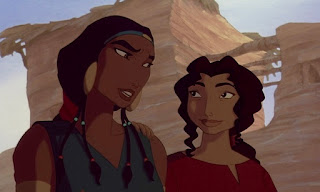
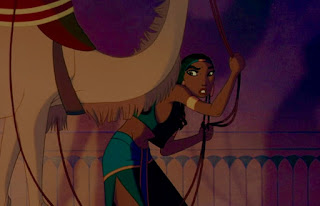
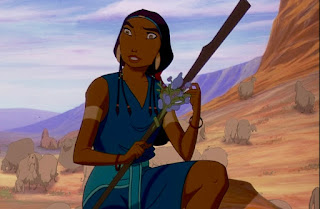
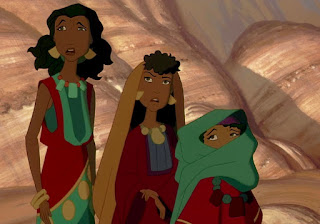
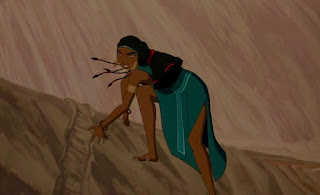
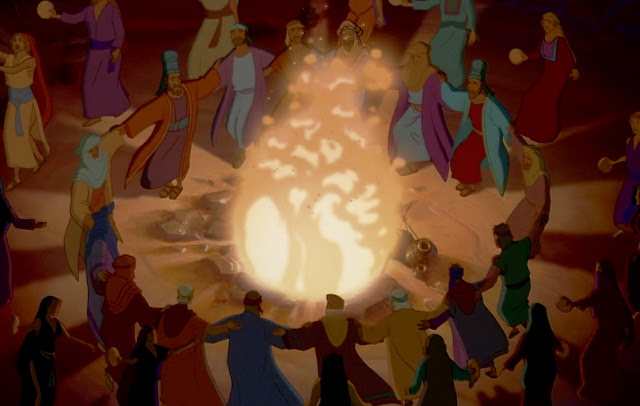
While I fuly agree with the personal analysis of the charchter of Tzipporah, her plot line is eventually based on the biblical story. First of all, the Midianite were a tribe split away from the Hebrew people during the generations after Jacob's sons went down to Egypt during the draught. They are also of Hebrew faith - Jethro was a priest and Moses' spritiual mentor when he becae a religious, national leader. While the introduction of Tzipporah is very different in the biblical story - Moses meets her when he saves her and her sister from the bandits y the well. In return to the favor of saving his daughters, Jethro gives his eldest daugther to Moses in marriage. And when she joins him in his quest to Egypt, she joins him - with their infant son, as his property.
ReplyDeleteThe movie, luckily, gives its female charcaters - Tzipporah as well, but also Meriam, Moses' adoptive mother and his sister MeriamThe agency, spirit heart and sharp minds and tongues. I always loves this movie despite its many faults because of that. It gives a huan depth to this mythic, religious charcters, but also fills in blanks about the biblical charcters in a favorable way, where in the biblical text they are often erased or pushed to the sidelines.
I agree with a lot of what you have to say here, but I do feel that your comment about most of the characters being played by white people is both unnuanced and inaccurate. While many of them were white, they tried very hard to cast Jewish actors as Jewish characters, which is very important to me. Most of the time you see Jews playing gentiles. Also, the actress who played Yocheved, Ofra Haza, was in fact a Yeminite Jew.
ReplyDeleteI have always been fascinated by the subtext about Tzipporah's tribe, and their lifestyle as a metaphor for actual freedom, even if I felt Tzipporah herself was a character cliche, especially in the context of animated females characters from that time. She's likeable, but I think "revolutionary" is a stretch. Even for female Arab characters.
ReplyDeleteThe true pioneer of the sexy, edgy, take-no-shit animated heroine persona was Jasmine in Aladdin - another Arab/Arab-coded woman. (Agrabah's not an actual place but a mashup of different Arab locations.) And then the formula was used over and over again on so many other Disney women (plus Anastasia) that by the time The Prince of Egypt came around, it was a trope animated heroines (particularly women of color) were more or less locked into.
Personally, I've always been more intrigued by the alternative spins Prince of Egypt puts on what it means to be a strong woman - in Yocheved's vulnerability, Queen Tuya's silent regality and nurturing, and in Miriam, whose strength lies in using traditionally "soft" qualities like compassion and hope and optimism as tools for agency and for rising above trauma, which slavery undoubtedly is.(All of whom go underappreciated because they lack the typical hard edges.) Tzipporah is certainly likeable and I'm glad the movie shows her relationship with Moses as a true partnership. But they didn't have the time to give her the backstory or motivations that Moses, Rameses, Miriam or even Aaron got to keep her from being more than a stock character. Probably because the real love story is between Moses and Rameses. The romantic subtext between those two is an essay in itself:)
Actually tzipporah was black and her ethinicity was ethiopian according to the bible not arab
ReplyDeleteYou should examine this blog for even more great writing articles.
ReplyDeletesexy girls phone number
ReplyDeletecall girl picture
sex girl in kolkata
college call girls in kolkata
kolkata call girl services
sex girl kolkata
kolkata sex call girls
call girl contact in kolkata
direct call girl number
KOLKATA ESCORTS
ReplyDeleteKOLKATA ESCORT
KOLKATA ESCORT SERVICE
KOLKATA INDEPENDENT ESCORTS
KOLKATA INDEPENDENT ESCORT
ESCORT IN KOLKATA
ESCORTS IN KOLKATA
VILLAGE CALL GIRLS
VILLAGE CALL GIRL
CALL GIRL
CALL GIRLS
ESCORT
ESCORTS
KOLKATA FEMALE ESCORTS
KOLKATA HOTEL ESCORTS
KOLKATA MODEL ESCORTS
KOLKATA CALL GIRL
KOLKATA CALL GIRL SERVICE
KOLKATA CALL GIRL SERVICE
KOLKATA CALL GIRLS
CALL GIRL
CALL GIRLS
CALL GIRLS SERVICE
CALL GIRL SERVICE
KOLKATA INDEPENDENT CALL GIRLS
KOLKATA INDEPENDENT CALL GIRL
ESCORT
ESCORTS
https://www.guest-articles.com/education/how-to-pass-gaqm-iso-iec-li-exam-on-first-try-10-12-2020
ReplyDelete